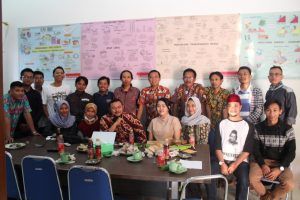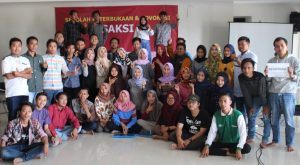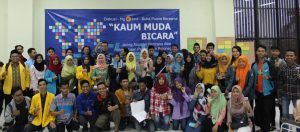Optimism in the Face of Transition – Bojonegoro
It was 2018, and Bojonegoro (a regency in East Java, Indonesia) was facing a Regional General Election for a new Regent. Those who had been involved in the Open Government PartnershipThe Open Government Partnership (OGP) is a multi-stakeholder initiative focused on improving government transparency, ensuring opportunities for citizen participation in public matters, and strengthen... More (OGP) locally knew that a transition in leadership would pose a risk to the regency’s continued OGP participation. This made it incumbent on Aw Syaiful Huda, Director of the Bojonegoro Institute (BI), and other civil society colleagues shepherding OGP processes in Bojonegoro to think of steps to ensure that the work would go on.
“We realized at the beginning that we would face considerable challenges. First, we knew we must prepare the OGP 2018-2020 Action PlanAction plans are at the core of a government’s participation in OGP. They are the product of a co-creation process in which government and civil society jointly develop commitments to open governmen... during a leadership transition in the government. Second, the Action Plan would be implemented in the period of the new regent. Whatever the situation, we remained optimistic. We knew we could not give up and lose our hope,” said Syaiful confidently.
Three years earlier, Syaiful and his colleagues at the Bojonegoro Institute had begun ushering in the era of Bojonegoro’s participation in the OGP. Bojonegoro was selected as one of the 15 pioneer governments in the OGP Sub-nationalRecognizing that much of what impacts people’s daily lives occurs at the local level, many OGP countries are working to open up lower levels of government by creating commitments focused on subnatio... Pilot Program in 2016.
To Syaiful’s delight, the early years of implementation ran smoothly, and collaboration with local government became well-established. At the end of Bojonegoro’s first period in the OGP, he and other civil society activists were hopeful that OGP-inspired practices would continue and grow stronger over time. He believed that open government and public participationGiving citizens opportunities to provide input into government decision-making leads to more effective governance, improved public service delivery, and more equitable outcomes. Technical specificatio... would increase public trust in the government and create more space for innovation in local development. However, local champions of the initiative recognized that it would be a significant challenge to sustain momentum during a leadership transition.

Leveraging Networks to Maintain Momentum
The period of leadership transition did have a profound effect on the preparation process for the Bojonegoro OGP Action Plan for 2018-2020. In early 2018, Acting Regent Dr. Suprianto, SH, MH, who was new to Bojonegoro, took office. The Bojonegoro Institute worked to consolidate and coordinate an informal group of key stakeholders in the region, including government officials, other members of local civil society, social groups, and journalists, to respond to the new leadership dynamic. They agreed on strategic steps and a division of roles to establish communication with the Acting Regent, and made considerable efforts to convey the objectives for preparing the Action Plan. The challenge was compounded by the Acting Regent’s perception that OGP activities were only part of the former regent’s agenda, and hence they were not a priority.
In addition, the Bojonegoro Institute reached out to the Open Government Indonesia (OGI) Secretariat, the Office of the Presidential Staff (KSP), and national civil society networks for help in communicating the national significance of OGP. “I contacted colleagues in Jakarta, including OGI and KSP Secretariat, because I believed if the national level government communicated the importance of OGP, it would be more accepted by local officials,” said Syaiful.
Following a meeting that included the OGI Secretariat, the KSP, the Acting Regent and his key officials, Syaiful Huda met with the Acting Regent informally to deliver the agenda that had been put together for preparing the Action Plan. “Regent Suprianto supported the agenda and handed over the preparation and technical implementation to his First Assistant. I felt this was a small victory for our joint effort. We never gave up,” he said.
Although the Action Plan preparation activities felt plodding at first, they were made possible by the participation of numerous key local champions. Overall, the dialogue ran smoothly. However, there was quite a debate over the nine proposed commitments. CSOs sought more ambitious goals, but Regional Working Unit (abbreviated as SKPD) representatives were aware that the financial resources available for implementation were limited. Through compromise, the stakeholders agreed on five commitments, and in August, the Draft OGP Action Plan for 2018-2020 was successfully submitted to the OGI Secretariat.
For Syaiful Huda, there were five noteworthy achievements:
- The Action Plan was produced through a participatory approach and with the support of key local actors. It was endorsed and submitted by Acting Regent Suprianto to the National Development and Planning Agency (Bappenas) and the OGI Secretariat.
- There was an increase in the number of civil society representatives, academics, journalists, disability advocacy groups, youthRecognizing that investing in youth means investing in a better future, OGP participating governments are creating meaningful opportunities for youth to participate in government processes. Technical ... More groups, and women’s groups involved in the preparation of the Action Plan. Only three CSOs were involved in the preparation of the first Action Plan, but this time there were nineteen.
- The number of SKPDs involved increased from five to twelve.
- The Bojonegoro Mid-Term Regional Development Plan (RPJMD) mainstreamed the OGP approach, including commitments to strengthen the bureaucratic reform agenda, increase government transparencyAccording to OGP’s Articles of Governance, transparency occurs when “government-held information (including on activities and decisions) is open, comprehensive, timely, freely available to the pub... More and accountability, and enhance public participation.
- Fifth, an internet-based information system was established for the development and implementation of the Action Plan. Through this system, the public can access relevant information as well as provide suggestions and evaluate progress.

Different Leader, Different Strategy
In September 2018, Anna Muawanah and Budi Irawanto were appointed as Regent and Vice Regent of Bojonegoro, respectively, for the 2018-2023 period. This marked an era of new leadership in Bojonegoro, and sustaining involvement in the OGP depends on their commitmentOGP commitments are promises for reform co-created by governments and civil society and submitted as part of an action plan. Commitments typically include a description of the problem, concrete action... to the agenda. Various stakeholders have tried to establish a relationship with the new regent on this issue, but so far there has been limited response.
It is common for leadership transitions to impact development agendas and strategies. Today’s challenge is how to promote the OGP as an appropriate model for developing good governance. Kusnandaka Tjatur, the Head of the Bojonegoro Communication and Information Office, is a strong advocate who has been overseeing the implementation of OGP at the technical level. As an OGP champion in the local government, he aims to use persuasive communication strategies to maintain the momentum toward openness by looking for entry points within the Regent’s agenda.
Kusnandaka is optimistic that the Bojonegoro government will continue to value openness. In fact, to date, openness practices are still ongoing, although they are labeled differently. “The Regent prefers the terminology of Transparency, Government, and Accountability (TGA) as her legacy. This, in essence and practice, is very similar to the values and spirit of the OGP,” he said.
Kusnandaka also mentioned that four of the five commitments in the current Action Plan are moving ahead as planned. In the area of open contractingA transparent procurement process, known as open contracting, increases competition, improves public service delivery, and ensures governments better value for their money. Technical specifications: C... More, for example, an application was developed that is automatically updated with new data from the national government procurement data system. However, the regional regulations related to Community Health Service Standards and for civic registration records have not been published as planned.
Syaiful expressed his apprehension by saying, “What concerns me is that the new regent perceives the OGP as a pretentious project of the previous regent… Therefore, to maintain the sustainability of the OGP we are using public promotion and soft campaign strategies.” As part of this, the Bojonegoro Institute recruited and trained around 100 volunteers to voice and promote values and transparency practices. “They can be infomediaries for citizens,” said Syaiful.
Lilis Aprelliati, one of the Bojonegoro Institute activists, conceived the idea of working with Transparency International Indonesia and Indonesia Corruption Watch in collaboration with the Corruption Eradication Commission (KPK) in order to generate more momentum behind the values and principles of open government in Bojonegoro. As a result of this collaboration, Regent Muawanah signed a Joint Commitment for an Integrated Corruption Eradication Program with KPK in March 2019. This was seen as a positive signal about the government’s commitment to good governance. Now Lilis feels more optimistic that support from the regency’s citizens will help sustain open government approaches. The stages are indeed to build awareness first, then turn it into a movement, so that henceforth the government’s openness will become habit or culture.
The progress made during the leadership transition included the joint accomplishments of multiple stakeholders committed to open government. There is still much work to be done. Syaiful remains hopeful and sees a significant role for OGP stakeholders to play in this new environment. He stated, “Our duty is to guard the values of openness, transparency, accountability, and to build innovations based on public aspirations.”


Leave a Reply